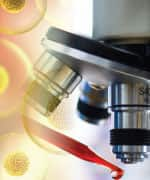Life Extension Magazine®

Dr. Thierry Hertoghe is one of the world’s leading experts and practitioners of hormone replacement therapy for longevity and disease prevention.
In this exclusive two-part interview, Dr. Hertoghe, president of the International Hormone Society and the World Society of Anti-Aging Medicine, tells Life Extension® how hormone therapy can help fight disease and promote longevity.
There are roughly 50 different hormones produced in the human body, controlling a wide range of functions.
In the previous interview, published in our last issue, Dr. Hertoghe spoke to Life Extension® about how hormone replacement therapy can help prevent disease and promote longevity. In this follow-up, he discusses specific hormones, and the role nutrition plays, as well.
LE: Which hormones do you feel are the most important?
Dr. Hertoghe: Melatonin is one of my favorite hormones. It does much more than just improve sleep. High melatonin doses (10 mg to 30 mg a day) can be safely applied in the first days after a stroke or heart attack and may markedly reduce the damage to the brain and heart and considerably improve recovery. Melatonin can also have profound anti-inflammatory effects and improve resistance against viral and bacterial infections. Melatonin also has a role in protecting against radiation, including electromagnetic and ultraviolet radiation. It reduces blood pressure and can calm excessive anxiety, especially at night, substantially decreasing anxious thoughts and restless legs.

Melatonin has even been shown to have powerful anti-cancer effects and can be used as an important adjuvant treatment (alongside the primary treatment) in various types of cancer. One of the most surprising effects is in rejuvenating the skin when applied topically as a cream. It improves the skin coloring, reduces pigment spots, and thickens the skin.
DHEA is the most abundant hormone in our blood. One often overlooked but important role it plays in the body is to protect us against any side effects of cortisol. Cortisol is our most essential hormone—if we stop producing it, we die within 24 hours! But it is so powerful that we need to have equivalent amounts of protective DHEA in our body to block any adverse effects of cortisol. When given alone, DHEA improves mood and quality of life and reduces anxiety. Particularly in women, DHEA may also improve muscle tone—especially in the abdomen—while mildly reducing fat mass and increasing bone mass.
Testosterone is another one of my favorite hormones. I recently wrote a book on testosterone therapy for men called Testosterone, the Therapy for Real Gentlemen. It is, in my experience, an amazing treatment not only for men, but also for women. Testosterone usually increases energy levels all day long. It particularly reduces sports fatigue, making men and women more resistant to exhaustion from physical exercise and activities. It can improve mood and reduce anxiety. Testosterone also improves the bones and is one of my treatments for acute stroke and to protect the heart.
LE: What do you have to be careful about when prescribing hormones?
Dr. Hertoghe: Balancing hormones means being careful not to give too much of one hormone, while assuring that enough of another hormone is given so that the treatment works safely and efficiently. The right balance is often achieved, in consultation with a physician, after a period of trial and error.
Take, for example, balancing the female hormones. Women need estrogens to protect their brain from Alzheimer’s disease, their heart and arteries from atherosclerosis, and their bones from osteoporosis. But if the estrogen hormone estradiol becomes predominant, women suffer from fluid retention, particularly on the breasts and abdomen. They may develop breast and ovarian cysts and uterine fibroids, and ultimately cancer in these areas. In contrast, the other main female hormone, progesterone, protects against estradiol predominance. A woman may safely take estrogens and obtain blood levels that equal those of healthy young women if she also takes sufficient amounts of natural progesterone.
Similarly, testosterone is one of the best treatments to protect the heart. But it may excessively convert to the potent estrogen estradiol, which at high levels has deleterious effects on the heart and arteries by blocking testosterone receptors. High estrogen levels also enlarge the prostate. For this reason, men who receive testosterone should regularly have their estrogen levels checked. Whenever these levels excessively increase, it might be necessary to add a natural or synthetic aromatase blocker, which blocks excessive conversion of testosterone to estradiol, to ensure safety for the heart, arteries, and prostate.
LE: What is the most unusual condition you have treated through hormone replacement?
Dr. Hertoghe: We have treated several eyesight problems with local hormone injections. Hormone replacement has helped treat autism in children, stabilize Parkinson’s disease, reverse some paralysis of one hand three years after a stroke, improve heart condition after three heart attacks, and more. However, the most impressive improvements are usually found in patients with psychiatric disease, such as severe depression and anxiety disorders.
In fact, the entire body is under the influence of hormones. If a chronic problem appears in any part of the body, the local disorder may not improve without adequate hormone therapy, sometimes administered locally. For example, if you have a wound that does not heal many weeks after surgery, it may be due to a lack of anabolic hormones. One solution is to apply a thin layer of transdermal testosterone locally, which substantially accelerates healing, so that after five to seven days the wound may be healed.
LE: You also focus on nutritional supplements in your practice in Belgium. How do you use them therapeutically?

Dr. Hertoghe: I prescribe at least as many nutritional supplements as hormone supplements to my patients. Nutritional supplements, such as magnesium, zinc, copper, iron, selenium, fatty acids, vitamins A, B9, B12, D, and E, are given after a blood test shows a low or low-to-normal level. The lab does not test nutrients such as carnitine, which provides energy and improves the body composition, and the sleep supplements tryptophan and 5-hydroxy-tryptophan, so I may recommend patients take those solely based on their complaints.
In most cases, I start by prescribing the nutritional supplements for six months. If levels are, after this period, normalized in a blood test, the patient may stop the treatment. Some nutritional supplements, such as magnesium, carnitine, and tryptophan, may need to be taken permanently, as the diet or patient may be permanently depleted in these nutrients.
LE: How do you think medicine will change in the next decade?
Dr. Hertoghe: There will be a greater attention to hormonal and nutritional therapies. I also believe that stem cell therapy and supplementation with stem cell activators will develop more in the future. They may, for example, be used to regenerate brain areas and regrow teeth. Also, physicians in the future are going to treat more with organ specific peptide therapies (small amino acid chains with restorative properties) such as follistatin, which strongly improves muscle tone and volume. I think that telomerase activators, which reverse the shortening of our telomeres (the ends of our chromosomes that shorten at each cell division) also have a place in the future. In general, we will see much more focus on prevention of disease and aging, not just treating symptoms.
If you have any questions on the scientific content of this article, please call a Life Extension® Wellness Specialist at 1-866-864-3027.
Dr. Thierry Hertoghe practices medicine at his clinic in Brussels, Belgium, where he specializes in using hormone treatments and nutritional therapies to fight disease, optimize health, and promote longevity. He is president of the International Hormone Society and the World Society of Anti-Aging Medicine.

